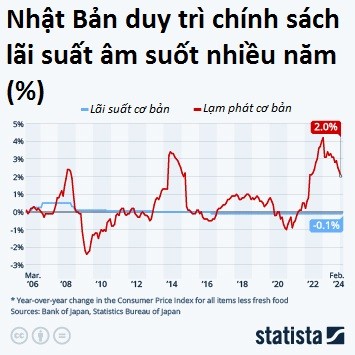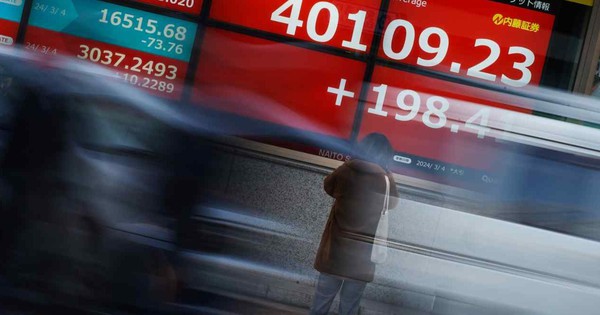Negative Interest Rates: Japan’s Economic Wonder or Deflationary Legacy?

The Japanese economy faced a crisis in the 1990s due to the burst of asset bubbles, resulting in a prolonged slowdown and the risk of deflationary spirals that pushed the country into several technical recessions. To stimulate the economy, Japan had to implement loose monetary policies, injecting money into the market and lowering interest rates to encourage business and investment rather than savings.
Since 2016, the Tokyo government has even adopted negative interest rates to reduce borrowing costs for businesses and enhance their operations and investment. It is this negative interest rate policy that attracted billionaire Warren Buffett to lead the wave of foreign investments pouring into Japan.
The Phenomenon of Negative Interest Rates
Negative interest rates, in theory, mean that depositors have to pay fees instead of receiving interest on their savings. The main purpose of this policy is to encourage people to withdraw money from banks and invest in business ventures rather than saving. Additionally, banks are also required to lower lending rates, making credit more affordable for enterprises.
In theory, negative interest rates create nearly perfect conditions for businesses and individuals in an economy to engage in borrowing, as they essentially do not have to pay interest on their loans. In the context of global economies still struggling to fully recover and the ongoing threat of deflation in the world’s largest economies, negative interest rates have become a cutting-edge solution pursued by central banks worldwide.
In Japan, the government hoped that negative interest rates would stimulate consumer spending, investment, and borrowing for home purchases and construction, much like their successful implementation in Europe. However, when such policies were applied in Japan, they faced several challenges.
The Legacy of Crisis
Firstly, in theory, businesses are expected to find it easier to borrow at lower interest rates. However, the increased lending with lower interest rates did not bring any significant benefits to them. Instead of expanding, financial institutions contracted their scale and tightened lending criteria. Consequently, borrowing costs for businesses and individuals not only did not decrease but even increased, hindering investment, business operations, and consumption.
Moreover, negative interest rates erode bank profits, which, in turn, affect stock prices and the overall stock market. It was only when Warren Buffett used his reputation to access low-interest loans and invested in Japan that the Japanese stock market attracted foreign investors and gained momentum.
Furthermore, negative interest rates caused the depreciation of the Japanese Yen, increasing the cost of importing raw materials for production and business activities. It should be noted that Japan is a resource-poor country and relies heavily on importing most of its production inputs.
Ironically, Japan has a remarkably complex payment system, leading to a situation where consumers tend to revert to using cash instead of depositing money in banks or investing. In the midst of the 1990s, cash transactions accounted for only about 10% of nominal GDP in the country. By 2013, this percentage had increased to 19%, indicating that cash transactions in Japan were twice as prevalent as in developed countries worldwide and three times higher than in the United States.
The main reason for hoarding cash at home is possibly due to a lack of trust in financial institutions, especially since World War II and the 1990s crisis. Additionally, Japan, being prone to natural disasters, sees cash as the king, useful in any emergency situation.
The 2011 tsunami disaster was the clearest example as the number of Japanese citizens purchasing safes to store cash surged. According to estimates, Japan annually holds about $350 billion in cash in secure safes.
Thus, negative interest rates have led the Japanese to store money at home rather than using it for business purposes. The enormous amount of cash hoarded by the population, combined with a loyal work culture but limited wage increases by businesses, has created a paradoxical situation.
Workers lack disposable income and time to spend, and businesses are hesitant to invest due to the unchanged cost of credit, leading to the ghost of recession haunting the Japanese economy for many years. Although the Tokyo government recognizes this issue, there is little else they can do. Increasing interest rates would only repatriate capital and reduce the attractiveness of investment.
Only recently, with the resurgence of inflation, wage increases for workers, and Warren Buffett leading the influx of foreign investments, has the Japanese stock market seen growth. Therefore, when Japan officially abandons negative interest rates, many economists predict that the country’s economy will enter a new phase, which will have a positive impact on the global market.
*Source: Tổng hợp

